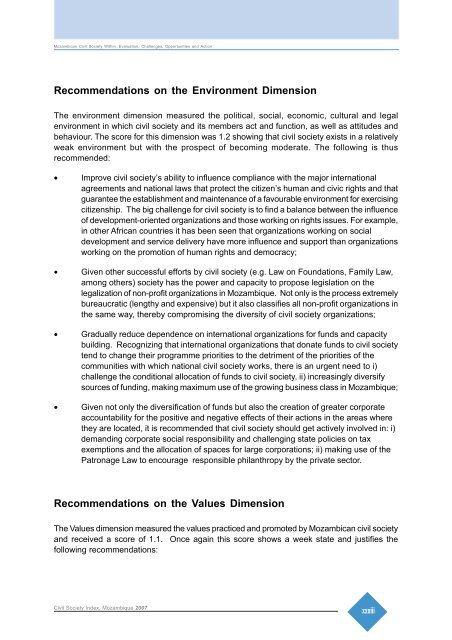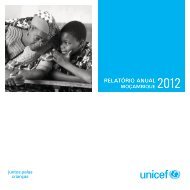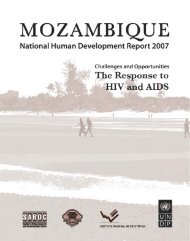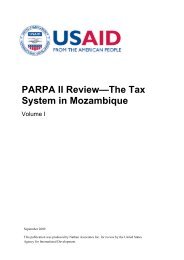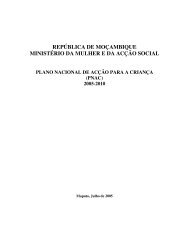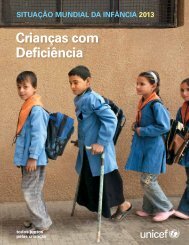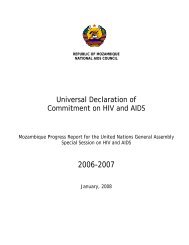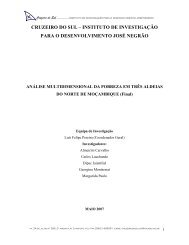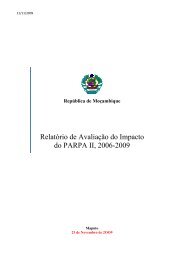Mozambican Civil Society Within: - UNICEF Mozambique - Home page
Mozambican Civil Society Within: - UNICEF Mozambique - Home page
Mozambican Civil Society Within: - UNICEF Mozambique - Home page
You also want an ePaper? Increase the reach of your titles
YUMPU automatically turns print PDFs into web optimized ePapers that Google loves.
<strong>Mozambican</strong> <strong>Civil</strong> <strong>Society</strong> <strong>Within</strong>: Evaluation, Challenges, Opportunities and Action<br />
Recommendations on the Environment Dimension<br />
The environment dimension measured the political, social, economic, cultural and legal<br />
environment in which civil society and its members act and function, as well as attitudes and<br />
behaviour. The score for this dimension was 1.2 showing that civil society exists in a relatively<br />
weak environment but with the prospect of becoming moderate. The following is thus<br />
recommended:<br />
• Improve civil society’s ability to influence compliance with the major international<br />
agreements and national laws that protect the citizen’s human and civic rights and that<br />
guarantee the establishment and maintenance of a favourable environment for exercising<br />
citizenship. The big challenge for civil society is to find a balance between the influence<br />
of development-oriented organizations and those working on rights issues. For example,<br />
in other African countries it has been seen that organizations working on social<br />
development and service delivery have more influence and support than organizations<br />
working on the promotion of human rights and democracy;<br />
• Given other successful efforts by civil society (e.g. Law on Foundations, Family Law,<br />
among others) society has the power and capacity to propose legislation on the<br />
legalization of non-profit organizations in <strong>Mozambique</strong>. Not only is the process extremely<br />
bureaucratic (lengthy and expensive) but it also classifies all non-profit organizations in<br />
the same way, thereby compromising the diversity of civil society organizations;<br />
• Gradually reduce dependence on international organizations for funds and capacity<br />
building. Recognizing that international organizations that donate funds to civil society<br />
tend to change their programme priorities to the detriment of the priorities of the<br />
communities with which national civil society works, there is an urgent need to i)<br />
challenge the conditional allocation of funds to civil society, ii) increasingly diversify<br />
sources of funding, making maximum use of the growing business class in <strong>Mozambique</strong>;<br />
• Given not only the diversification of funds but also the creation of greater corporate<br />
accountability for the positive and negative effects of their actions in the areas where<br />
they are located, it is recommended that civil society should get actively involved in: i)<br />
demanding corporate social responsibility and challenging state policies on tax<br />
exemptions and the allocation of spaces for large corporations; ii) making use of the<br />
Patronage Law to encourage responsible philanthropy by the private sector.<br />
Recommendations on the Values Dimension<br />
The Values dimension measured the values practiced and promoted by <strong>Mozambican</strong> civil society<br />
and received a score of 1.1. Once again this score shows a week state and justifies the<br />
following recommendations:<br />
<strong>Civil</strong> <strong>Society</strong> Index, <strong>Mozambique</strong> 2007<br />
xxxiii


